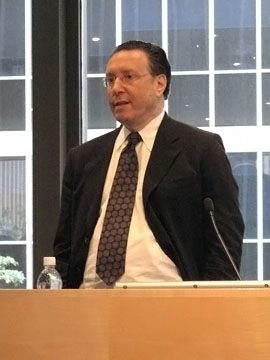
[Valerie Plame was the CIA agent outed by Robert Novak a newspaper column; the information was leaked to Novak and others. After Novak wrote his column, Cooper wrote that he had been given similar information from a confidential source. Time Inc. submitted Cooper’s notes under subpoena. The contents of these notes have not been publicly released, but Pearlstine has stated, “We believe that our decision to provide the Special Prosecutor with the subpoenaed records obviates the need for Matt Cooper to testify and certainly removes any justification for incarceration.” As the time of this writing, there are still outstanding subpoenas for Cooper and Judith Miller of the New York Times. It is not entirely clear if Novak has testified. (It is clear that Novak is an ass.)]
You can read about Pearlstine’s decision in the New York Times and Time magazine. Pearlstine also released a statement discussing his decision. The following quote from Pearlstine sums up his decision:
[…]Time Inc. shall deliver the subpoenaed records to the Special Counsel in accordance with its duties under the law. The same Constitution that protects the freedom of the press requires obedience to final decisions of the courts and respect for their rulings and judgments. That Time Inc. strongly disagrees with the courts provides no immunity. The innumerable Supreme Court decisions in which even Presidents have followed orders with which they strongly disagreed evidences that our nation lives by the rule of law and that none of us is above it.
The day his decision was announced, Pearlstine held an “on the record” town hall meeting at Time Inc. for all employees of the editorial divisions. (This includes me; the photo is from this town meeting.) Pearlstine stayed on message–while he went into a bit more depth regarding his decision, he did not waver from the gist of his written statement. He discussed several important issues:
- Money was not a factor.
- Senior managers, like Richard Parsons and Anne Moore, did not interfere with Pearlstine’s decision
- The decision was not made quickly or without great thought
Should I believe Pearlstine? I do. There is no good reason for him to lie about this kind of decision and his arguments were rational and well thought out. However, while Pearlstine was truthful and rational, his conclusions were incorrect.
Most importantly, Pearlstine gave inordinate weight to the rule of law. I believe the rule of law is important, but it is not sacrosanct. I believe we as a company and as individuals have a responsibility to violate the law in acts of civil disobedience if the law is wrong. And In this case the law is wrong. I do not believe that Time Inc. is above the law, and part of civil disobedience is receiving punishment for violating an unjust law.
Interestingly, I do not believe that Pearlstine believes the rule of law is absolute. I doubt he castigates the underground railroad for illegally freeing slaves. In addition, if one of our reporters is arrested in China for writing an “illegal” article, I hope we will do everything in our power–both legal and illegal under Chinese law–to keep that reporter out of prison in China.
Most of the town hall meeting was composed of questions from the floor. I asked about an ongoing libel suit against Sports Illustrated in which the judge has ruled that Don Yeager, an SI writer, must disclose his confidential sources. (A summary of the case is available at law.com.) Pearlstine’s response was very telling. He made a couple of jokes about the case and indicated if we lost, then we would just go to the penalty phase. We would not reveal our sources. How does the rule of law standard apply here?
On a personal level, I feel that Pearlstine’s decision was a betrayal of our company’s values and of one of our employees. It is a fundamental tenet of journalism that you do not reveal sources after promising them confidentiality. You shouldn’t always promise sources confidentiality, but once promised, you should not renege on your promise. Cooper made a promise of confidentiality to a source–a promise he is still keeping. If Pearlstine was uncomfortable with using Cooper’s confidential source, he had no business approving Cooper’s article for publication. In publishing Cooper’s article, Time Inc. was bound by the same promise of confidentiality.
Why should anyone trust Time Inc. to protect confidential sources in the future?
While I am an employee of Sports Illustrated and Time Inc., I do not in any way speak for Time Inc. I am not directly involved in making decisions that effect the content of our magazines. The comments above represent my own opinions.